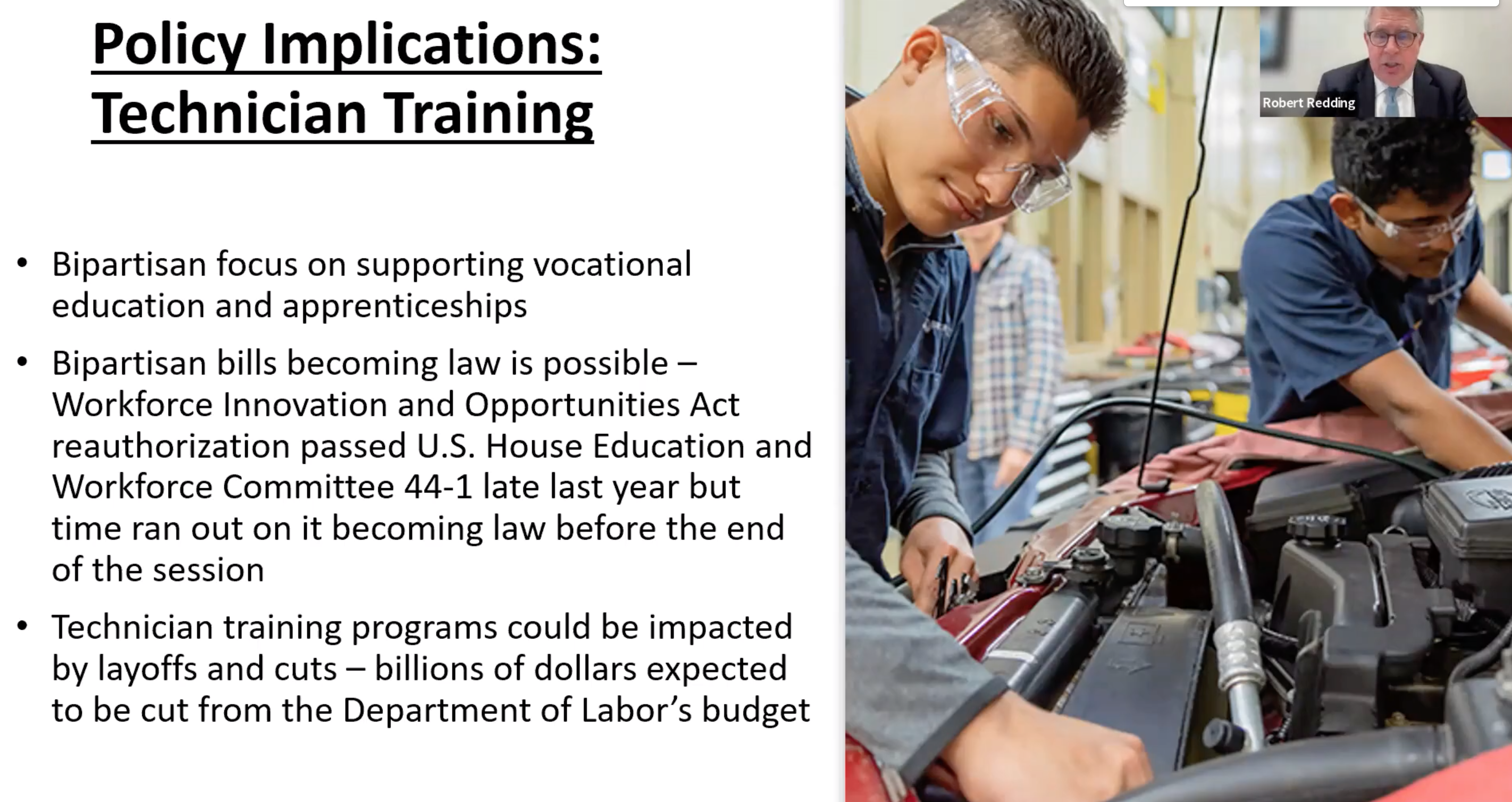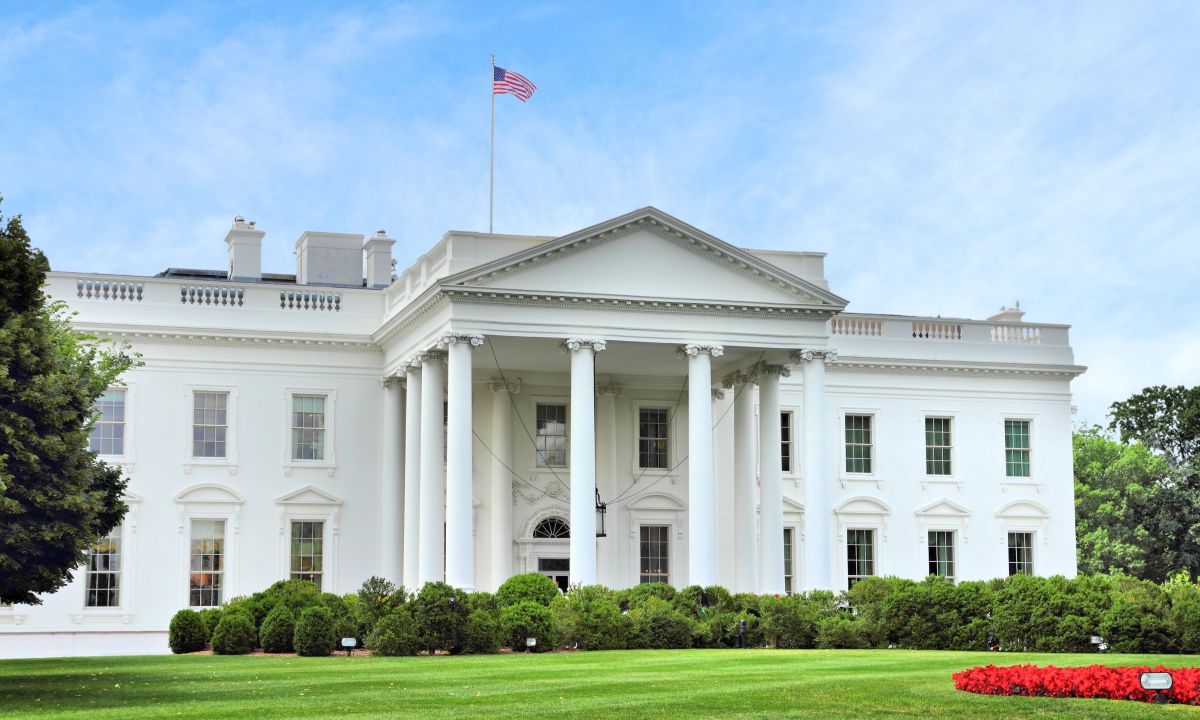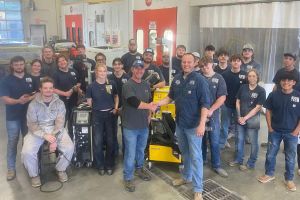In a recent AirPro Diagnostics TechTalk360 episode, Bob Redding, head lobbyist for the Automotive Service Association, addressed how the current U.S. Congress and presidential administration is affecting the collision repair industry in areas ranging from vehicle safety inspection to apprenticeship programs.
EVs and Safety Inspections
Redding urged industry members to watch closely the House Judiciary Committee, which he called “most important” for the collision industry because it handles a lot of antitrust and consumer issues that relate to insurers and repairs. The House Committee on Small Business will be another one to watch, he said, adding he anticipates lots of activity here, especially in the form of Small Business Administration initiatives.
In the Senate, the Commerce Committee, now chaired by U.S. Sen. Ted Cruz (R-TX), handles most issues pertinent to automotive repair, he said, and will likely present initiatives that differ significantly from the last Congress. Changes in ranking members on the banking and insurance and financial services committees are also important to keep track of as they will affect policy strategies, he pointed out.
Redding characterized the passage of the American Recovery Act late last year as a “good sign” for what’s to come with the 119th Congress for the collision industry. He said he hopes to see bills concerning industry issues, such as autonomous vehicles, that have been on the backburner get some attention. This Congress, he said, may yield more legislative activity, since both the Senate and House are Republican-controlled under a Republican presidential administration.
Redding predicted a “tough two years” for electric vehicle initiatives, especially in the area of subsidies and other encouragement for consumers to purchase EVs and for monies for EV charging station infrastructure.
“It's going to be more about what can be pulled back versus new initiatives or additional spending, so just be aware that the policies in the auto space that are probably the most dramatic for our industry would be electric vehicle policies under the last administration and the last Congress, versus what we have today,” he said.
Redding also referenced the REPAIR Act introduced in the last Congress by U.S. Rep. Neal Dunn (R-FL), who reintroduced the act in the House this session; it centers heavily on data access. It was also recently introduced in the Senate.
A draft for the SAFE Repair Act, which concerns data access, but also offers pro-consumer and independent repair shop provisions, was proposed in a letter to Congress in February and is still looking for sponsors to introduce it.
The SAFE Repair Act would also address the OE repair procedure issue that has existed at the state level for years with language stipulating that shops would not be penalized for using OE repair procedures. The act would also deal with vehicle safety inspection, giving authority to the U.S. Dept. of Transportation in post-repair collision inspection when a vehicle is resold. It would be an area, Redding said, for collision shops and consumers to watch.
It’s important, he noted, that legislation take place on a federal level, especially taking into consideration MSOs with locations that span state lines.
“When you have owners that have shops in multiple states, multiple laws impacting the daily life in that particular business, it's complicated,” he said. “It's harder to move people around. It's harder to train, and having a national policy or a national law or national federal regulation for shops on this issue and other issues is more valuable.”
Insurance and Tariffs
Redding said he’s not looking for any “radical initiatives” when it comes to insurance companies’ relationships with consumers and repair shops.
He did mention the Federal Insurance Office, created in 2010 to monitor state-level matters and point out consumer and small business issues that a federal regulatory entity could address. Redding called the agency “weak” in that it focused mainly on areas not being addressed at the state level rather than core issues affecting small business and consumers.
Despite these drawbacks, he said, a bill called the Federal Insurance Office Elimination Act introduced in this Congress will “struggle to go all the way” and could get lost. Either way, he said, it’s one to be aware of and track.
“Our hope on the collision side is that this agency could [move] more into something that would be more valuable to small businesses like collision shops and the collision industry as well as consumers, and to date that has not occurred,” Redding said.
He also touched on tariffs and the “back and forth” the issue has seen in past weeks. He pointed out lots of parts essential to collision shops come from Mexico and China.
“I think it's important for particularly collision shops to note that we have a really strong balance team in the U.S. Trade Representative’s Office,” he said.
Entities like these can closely watch how tariffs impact all sectors’ access to parts, parts pricing and competition. No one in the industry, he said, wants to take a step back toward COVID-era repair time length and difficulty obtaining parts.
The House Select Committee on the Chinese Communist party, he said, will highlight concerns from both Republicans and Democrats regarding the way agencies handle developments with tariffs and parts coming from China. It’s not a committee that would typically be pertinent to the collision industry, but developments during this Congress make it necessary.
Apprenticeships and Small Businesses
An expansion of interest throughout the U.S. Department of Labor in apprenticeships and vocational education characterized the first Trump administration, Redding pointed out. The issue has been particularly important in the House, he said, and with a Republican-controlled House and a Republican president, the collision industry needs to be vigilant in observing legislation that affects these areas.
“This is a real opportunity for us. We have an administration that wants to spend time and resources on apprenticeships, and I know the House, particularly, will be focused on how small businesses, education entities and the federal government can work together as well as states and localities and municipalities in the apprenticeship area,” Redding said.
 Screenshot of the presentation.
Screenshot of the presentation.
It’s important, he said, based on lessons from the last Congress, to see broad-based training that reaches beyond EVs and hybrids. It’s an initiative for which Redding feels resources and programs will accelerate. He encouraged shops and industry groups to take full advantage of this trend should it occur. Technician programs, he said, could be impacted by layoffs, but it’s important to see what’s available for students as programs are pushed down to the community and technical college level.
Redding also brought up autonomous vehicles. State-level programs, he said, have been neglected for decades. At one point, Congress insisted on safety inspection programs for states, which resulted in an expansion of such programs. That requirement was rescinded later, so those programs have been on the decline, he said.
Redding said he hopes the new Congress and administration will “take a serious look” at states with programs and in moving legislation forward will examine requirements for such programs.
Redding expects relief on some labor issues as legislation continues to develop. The regulatory process under this administration, he said, is still forming. He cautioned listeners to watch proposals versus published material, referencing a regulation draft from the last Congressional session that would have required collision shops to keep extra records on air quality and emissions. Shops, after advocate groups stepped up, were eventually removed from the language.
“Those are the sort of items that can catch us as small businesses when we are not careful,” he said. “I think we'll see less of that with this administration, and that is a good thing.”
Some tax provisions that pertain to small business are set to expire soon this year, he pointed out, but House Ways and Means Committee Chairman Jason Smith has worked on a package of tax extenders and attempts to convert some provisions into permanent law, as well as additional provisions that will be beneficial to small businesses.













